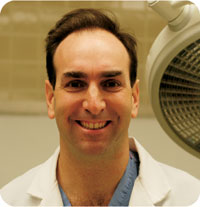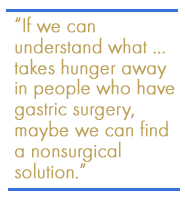

by Julie Garner
One of those researchers is UW Medicine Professor David Cummings, an expert on ghrelin. In a recent New England Journal of Medicine article, Cummings compared hormone levels of people who had lost weight through a gastric bypass to those at obese and normal weights. He found that the bypass group, who experienced a 36 percent weight loss, had ghrelin levels 77 percent lower than those at normal weight.
While it would seem logical that significant weight loss would trigger higher ghrelin levels, this is not what happens in people who have gastric bypass surgery. "There are many hormones involved in appetite control, any one of which could be affected by surgery. Our goal is to understand the nonsurgical mechanisms of weight loss," says Cummings.
The researchers hope that their work may lead to a ghrelin-blocking drug that will produce the effects of gastric bypass surgery without a scalpel. A drug is preferable to surgery not only because it would eliminate most of the risk, but also because bypass patients have a hard time absorbing iron, calcium and vitamin B-12.

The positive health effects of dramatic weight loss are profound. Obesity is related to lung disease, heart disease and diabetes. "But if you lose the weight, you can lose the diabetes. In 85 percent of people who have the surgery, their diabetes disappears. Sometimes it disappears in a matter of days. Like appetite, it points to a chemical mechanism in which food exposed to the gut promotes appetite-and problems with insulin. If appetite can be suppressed and diabetes can be eliminated, maybe we can do this without surgery," Flum says.
Another goal of the research is to pinpoint who should have bariatric surgery and when it is a success. Currently, there are 10 million adult Americans eligible for the surgery, but there is no clear data about which patients will be successful at weight loss and maintenance and which will not.
Bariatric surgery pioneer Dellinger says that despite the growing number of surgeries, nobody has a proven system for predicting success or failure.
"There are many definitions of success: total weight loss, percent of excess weight loss, etc. I view the surgery as a success if the patient doesn't have a prolonged hospitalization, prolonged disability or infection, and loses enough weight to improve the medical conditions that led them to want the operation," he says.

While bariatric surgery may be effective for some, it's not for everyone. So what is the solution for the millions of overweight and obese Americans who face the daily struggle of losing weight and keeping it off?
Every researcher interviewed says that massive behavioral change is the first step. It boils down to lifestyle choices: Diet and exercise. Our sedentary life-along with other factors like "supersizing" meals and eating high-fat, calorie-dense foods-makes us fat. Once we become overweight, we are stuck on the merry-go-round of weight loss and weight gain, and it is very hard to get off.
"Without doubt, sedentary behavior is contributing. Nowadays people drive to a job and sit at a computer, so the same amount of caloric intake that would have produced a healthy weight 50 years ago will now make you obese," says Dellinger.
The good news about weight loss is that, in terms of health, a fairly small loss can have a large effect on conditions such as high cholesterol, high blood pressure and even a diabetic's level of medication.
"If you weigh 300 pounds and you drop to 285 pounds, you have a modest weight loss of 5 percent, but the benefits are not proportionate. The benefits are large where these co-morbid (conditions that often accompany obesity) conditions are concerned," says Cummings. "You really can have a positive effect on your health with even a modest loss."
Go To: Page 1 | Page 2 | Page 3
Sidebar: Patch Work: Stomach Bypass Pioneer Dr. "Patch" Dellinger